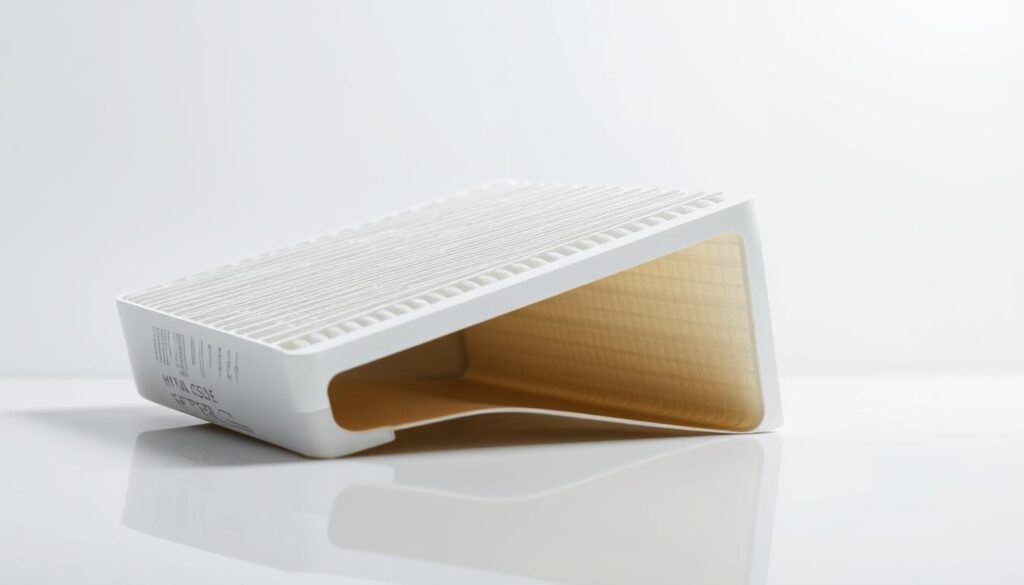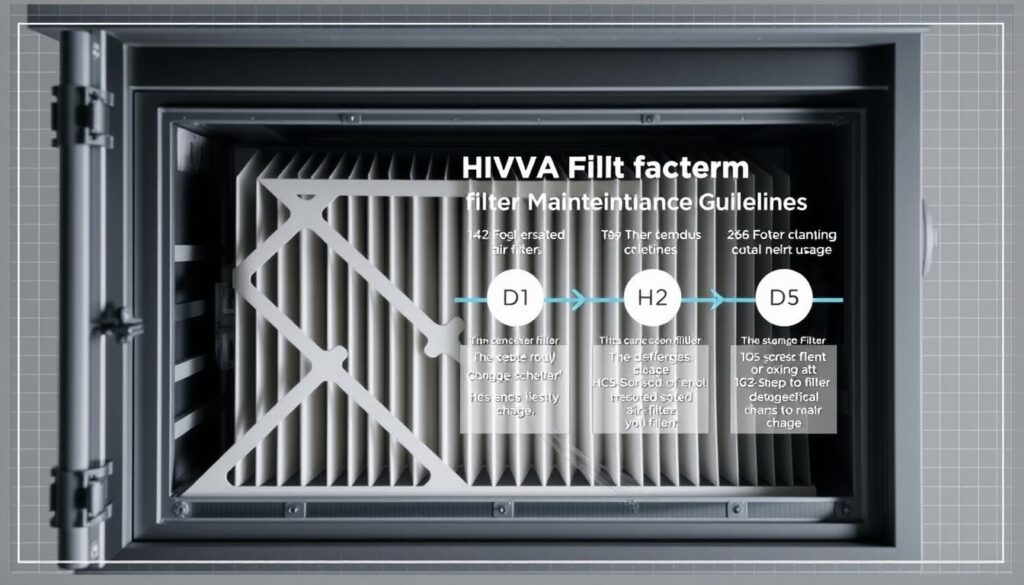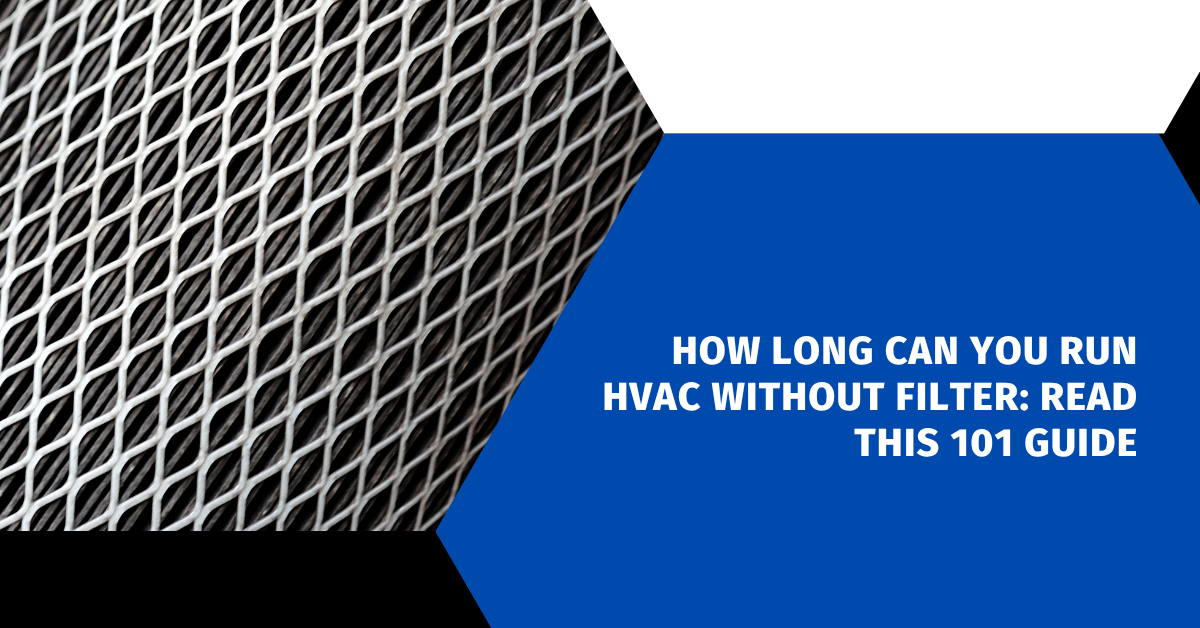Affiliate Disclosure
HVAC Guide Guys is a participant in the Amazon Services LLC Associates Program, an affiliate advertising program designed to provide a means for sites to earn advertising fees by advertising and linking to Amazon.
How Long Can You Run HVAC Without Filter? Ever thought about what happens if you don’t replace your HVAC filter? Running your HVAC without a filter is like driving without oil. It’s a big mistake. How long you can run your HVAC without a filter affects its performance, energy use, and your health.

Your HVAC filter is key to keeping your home comfortable. It might seem small, but it’s vital for your system and air quality. Without a filter, your HVAC can suffer damage that costs a lot to fix.
Knowing how long you can run your HVAC without a filter is important. It’s not about finding a way to avoid changing filters. Experts say it’s risky to run your system without one. Every minute without a filter can harm your HVAC.
Key Takeaways
- Running HVAC without a filter can cause immediate system damage
- Air filters protect both your equipment and indoor air quality
- Replacement filters are inexpensive compared to system repairs
- Regular filter maintenance prevents costly HVAC breakdowns
- Professional inspections can help maintain system efficiency
Table of Contents
Understanding HVAC Air Filters and Their Critical Role
Your home’s comfort and air quality depend a lot on your furnace and air conditioner filters. These key parts help keep your indoor air clean by catching bad particles. They also protect your HVAC system from damage.
Air filters do more than just block particles. They are advanced protectors of your indoor air. They catch many contaminants, keeping them out of your living space.
Types of Air Filters and Their Construction
HVAC filters vary in materials and designs, each with its own strengths:
- Fiberglass filters: Affordable and disposable
- Pleated filters: Better at catching particles
- Electrostatic filters: Use static to trap particles
- HEPA filters: High-efficiency for cleanest air
Primary Functions of HVAC Filters
Your air filters have several important jobs:
- Removing airborne pollutants
- Protecting your HVAC system
- Improving indoor air quality
- Lowering health risks from air pollution
Common Contaminants Filtered Out
The best furnace and air conditioner filters catch a wide range of pollutants, including:
- Dust and dust mites
- Pollen
- Pet dander
- Mold spores
- Bacteria
- Smoke particles
Keeping your home’s air clean starts with knowing how important your HVAC filters are.
Explore Our HVAC Shop
Looking for top-rated HVAC tools, parts, and accessories? Visit our shop and find the perfect solution for your needs.
Visit the ShopHow Long Can You Run HVAC Without Filter
Running your HVAC system without a filter is risky. It can harm your system badly. HVAC experts advise against it.
Damage from no filter can happen fast. Studies show damage that takes years can occur in just days. This means your system is at risk even for a short time without a filter.
- Immediate risks include increased debris circulation
- Potential for rapid internal component damage
- Accelerated wear on critical system parts
Not having a filter also harms your air quality. This can lead to health problems for your family. Unfiltered air can cause:
- Increased respiratory problems
- Higher levels of dust and allergens
- Potential mold and debris accumulation
Without a filter, your HVAC uses more energy. This means higher bills. Experts say unfiltered systems can cost up to 15% more to run.
| Operation Duration | Potential Risks |
|---|---|
| 1-24 hours | Minimal immediate damage |
| 24-72 hours | Increased system strain |
| 1 week+ | Significant component damage possible |
Pro tip: Always replace your HVAC filter every 1-3 months to maintain optimal system performance and protect your investment.
Explore Our HVAC Shop
Looking for top-rated HVAC tools, parts, and accessories? Visit our shop and find the perfect solution for your needs.
Visit the ShopThe Hidden Dangers of Operating HVAC Systems Without Filters
Running your HVAC system without filters can lead to serious risks. These risks affect both your equipment and your health. It’s important to understand these dangers for good hvac maintenance and a safe indoor environment.
Without air filters, your HVAC system faces many challenges. These challenges can cause long-term problems.
Immediate System Performance Risks
Removing air filters makes your HVAC system more prone to problems:
- Dust and debris quickly build up in important parts.
- Energy efficiency drops without filters.
- Parts work harder, leading to more wear and tear.
- There’s a risk of motor and compressor damage.
Long-Term Equipment Damage
Running your system without filters can damage its core parts. Without protection, parts wear out faster. This can lead to a complete system failure.
| Component | Potential Damage | Estimated Repair Cost |
|---|---|---|
| Compressor | Mechanical stress and premature aging | $1,500 – $2,500 |
| Evaporator Coil | Dirt accumulation and reduced efficiency | $800 – $1,200 |
| Blower Motor | Increased friction and possible burnout | $450 – $800 |
Health and Safety Concerns
Unfiltered HVAC systems also harm indoor air quality. This can lead to health problems like:
- Respiratory issues
- More allergens in the air
- Higher chance of catching airborne diseases
- Worsening of asthma and allergy symptoms
It’s key to keep your HVAC system well-maintained and filtered. This protects your equipment and keeps your family healthy.
Impact on Indoor Air Quality and Health

Your HVAC system is key to keeping your air clean. Without good filters, your home can become a haven for harmful pollutants. These can harm your health and make you uncomfortable.
When you ignore your HVAC system, indoor air quality suffers. Unfiltered air spreads dangerous particles everywhere. This can lead to health problems.
- Dust and pollen accumulation
- Mold spore proliferation
- Pet dander distribution
- Volatile organic compound (VOC) circulation
Americans spend about 90% of their time indoors. So, clean indoor air is vital for our health. Poor air quality can cause breathing issues, allergies, and long-term health problems.
HEPA filters are very effective, catching 99.97% of particles as small as 0.3 microns. Keeping your HVAC system in good shape and using high-quality filters can greatly reduce harmful particles in the air.
Clean air is not a luxury—it’s a necessity for your health and well-being.
Regular maintenance and replacing filters are key. They help prevent “sick building syndrome.” This can cause headaches, fatigue, and breathing problems.
Protect your health by prioritizing your HVAC system’s air filtration capabilities.
Critical System Components at Risk Without Filtration
Your HVAC system has many parts that need a filter to work right. Without one, these parts can get damaged and wear out fast. This can hurt your home’s comfort and cost you money.
- Motor and compressor vulnerability
- Evaporator coil deterioration
- Ductwork contamination
Motor and Compressor Strain
Without a filter, your HVAC’s motor and compressor have to work too hard. Just 24 hours without a filter can accelerate wear and tear. Dust and dirt make them work less efficiently and can cause them to fail early.
“An unprotected HVAC system is like a car running without an oil filter – disaster is inevitable.”
Evaporator Coil Damage
The evaporator coil attracts dirt and debris without a filter. This buildup stops it from cooling properly. Your system has to work harder, leading to less cooling and higher energy bills.
Ductwork Contamination
Without a filter, your ducts collect dust, allergens, and even germs. Places like Annapolis have more particles in the air. So, a filter is key to keeping your air clean.
Keeping your HVAC system safe is not just about the equipment. It’s about having a clean, efficient, and healthy home.
Energy Efficiency and Cost Implications
Not having air filters in your HVAC system can really hurt your home’s energy use. An unfiltered system has to work harder, which means it uses a lot more energy. This can make your utility bills go up a lot.
The U.S. Department of Energy says clogged filters can make your heating and cooling use 15% more energy. This can be very hard on your wallet.
How well you take care of your HVAC system affects how much energy it uses. About 41.5% of your yearly energy bill comes from your HVAC. Without air filters, your system can start to work less well and get stressed out.
- Unfiltered systems consume more electricity
- Increased energy consumption raises utility bills
- Potential long-term damage to HVAC components
Not having air filters is a big deal for energy efficiency. Dust and other stuff can build up in your system. This makes your HVAC work harder and use more power.
This extra work not only makes your energy bills higher. It also makes your expensive HVAC parts wear out faster.
Changing your filters regularly is important for saving energy. Using good filters and changing them every 3 months can save you up to 15% on energy costs. It also helps keep your HVAC system in good shape.
Explore Our HVAC Shop
Looking for top-rated HVAC tools, parts, and accessories? Visit our shop and find the perfect solution for your needs.
Visit the ShopSigns Your HVAC System is Running Without Proper Filtration
Spotting problems with your HVAC system’s filtration early can prevent expensive fixes and health issues. Your HVAC system gives clear signs when it’s not working right. Knowing these signs is key for keeping your system running well.
Not using a filter in your HVAC system can really affect your home’s comfort and how well it works. About half of HVAC system failures are due to bad maintenance. So, it’s important to catch problems early.
Performance Indicators to Watch
Your HVAC system shows its problems through several signs:
- Reduced Airflow: Weak air flow means there might be blockages or filter issues
- Uneven Temperature Distribution: If rooms don’t heat or cool evenly
- Higher energy use (up to 30% more bills)
- Lower system efficiency
Visual and Audible Warning Signs
Watch for these important visual and sound signs:
- Too much dust around vents and surfaces
- Strange noises like rattling or grinding from the unit
- Dirt on system parts
- Musty or burning smells when it’s on
Keeping an eye on things can stop big problems. With 80% of HVAC systems not running at their best, spotting these signs early can save you a lot of money and make your system last longer.
Proper Filter Maintenance and Replacement Schedule

Keeping your HVAC filter clean is vital for your home’s air quality and system efficiency. The lifespan of your hvac filter depends on several important factors.
Different air filters need to be replaced at different times. Here’s a detailed guide to help you maintain your HVAC system:
- Basic fiberglass filters: Replace every 30 days
- Pleated filters: Replace every 90 days
- Homes with pets: Change filters every 60 days
- Allergy sufferers: Replace filters every 20-45 days
Several factors affect when you need to replace your filter:
- Number of home occupants
- Presence of pets
- Indoor and outdoor air quality
- HVAC system age
| Filter Type | Recommended Replacement | Best For |
|---|---|---|
| Fiberglass | 30 days | Basic filtration |
| Pleated | 90 days | Better air quality |
| High-Efficiency | 45-60 days | Allergy sufferers |
Pro tip: Regular maintenance can extend your HVAC system’s life and improve indoor air quality. Always check your filter monthly and replace it when you see dirt or color changes.
Consistent filter maintenance is key to a healthy, efficient HVAC system.
Explore Our HVAC Shop
Looking for top-rated HVAC tools, parts, and accessories? Visit our shop and find the perfect solution for your needs.
Visit the ShopSolutions for Emergency Situations
When you face an hvac maintenance emergency without a spare filter, your first step is to protect your HVAC system. Quick action can stop major damage and expensive repairs.
In critical situations, follow these emergency guidelines:
- Immediately turn off your HVAC system if no filter is available
- Do not attempt to run the system without proper filtration
- Locate a temporary filter replacement within 24 hours
- Contact a professional HVAC technician if unsure about next steps
Temporary Filter Alternatives:
- Use a clean white cloth or thin cotton sheet as a short-term barrier
- Purchase a replacement filter from a local hardware store immediately
- Call an HVAC professional for emergency filter installation
Running your HVAC system without a filter can lead to serious risks. These include motor damage, poor air quality, and higher energy use. Experts suggest keeping spare filters on hand to avoid emergencies.
Always put your system’s health first. Keep up with regular hvac maintenance and have backup filters ready.
Professional HVAC Maintenance Tips
Keeping your HVAC system in top shape is more than just changing filters. Professional maintenance keeps your system running smoothly, avoiding sudden failures and extending its life. Regular check-ups can boost energy efficiency by up to 30%, saving you money on bills.
Experts say you should get your HVAC checked twice a year, in spring and fall. During these visits, technicians spot hidden problems that could harm your system. They’ll check important parts, oil moving parts, and make sure everything works right. This early action can save you from repair costs that range from $100 to $1,000.
When Professional Help is Critical
If you hear strange noises, feel uneven temperatures, or see your electricity bills go up, call a pro. These signs mean there might be serious issues that need a technician’s eye. A well-cared-for HVAC system can last 15 to 20 years. But ignoring maintenance can cut its life short. Getting professional help is cheaper than replacing the whole system unexpectedly.
Take care of your system by changing air filters, getting regular checks, and fixing any problems fast. Your effort in HVAC maintenance will keep your home comfortable, the air clean, and your system reliable for years.

